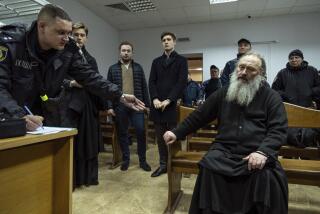U.N. peacekeepers in Lebanon deny acting timidly
In the wake of violent confrontations in southern Lebanon in recent weeks, the spokesman for United Nations troops on Monday rejected accusations that the peacekeepers were stepping timidly for fear of provoking Hezbollah’s Shiite militia.
Clashes between troops and villagers have sparked a debate about the role of the United Nations force in the south, a volatile stretch of the Middle East finally recovering from the ravages of several wars.
Lebanese and foreign critics of Hezbollah accused the group of stirring up trouble in order to cow international troops into staying on their bases and looking the other way as the militants rearm themselves in preparation for any future confrontation with Israel.
But U.N. peacekeepers have not reduced their footprint in the south, conducting between 350 and 400 patrols daily just as before, said Neeraj Singh, the international force’s chief spokesman. Moreover, it’s not the mission of the United Nations Interim Force in Lebanon, or UNIFIL, to disarm Hezbollah, but to lend support to the Lebanese army in the strip of land abutting Israel south of the Litani River, he said.
“There’s a lack of understanding about UNIFIL’s role here,” Singh said in an interview. “A lot of things attributed to UNIFIL as being active or inactive are actually outside the mandate. It’s the primary responsibility of the Lebanese army to make sure there are no weapons between the Litani River and the Israeli border.”
According to Singh, Shiite villagers near Kfar Kila confronted the UNIFIL troops in a minor incident June 29 and then more seriously July 3, when they used stones to pelt French soldiers conducting a patrol through the area of Touline, about five miles from Israel. The residents feared that a widespread UNIFIL military exercise signaled impending raids on their homes, Singh said.
The villagers dragged one soldier away, injuring him, and tried to pull mounted guns off armored vehicles as UNIFIL troops fired warning shots. The incident prompted the Lebanese army to intervene, and it set off alarm bells at the U.N. Security Council, which had bolstered an existing peacekeeping force in 2006 after a monthlong war between Hezbollah and Israel. The council held a meeting July 9 to discuss the clashes.
After the U.N. meeting, Lebanon announced plans to move as many as 5,000 additional troops to the south. Israel, which occupied southern Lebanon until 2000, has often accused the 12,000-to-14,000-member peacekeeping force of simply providing international cover that masks the Iranian-backed Hezbollah movement’s efforts to rearm.
Singh, however, said that UNIFIL had found no evidence of weapons smuggling to the south since the 2006 war, in which Hezbollah showered northern Israel with rockets.
Since the confrontation between the locals and troops, UNIFIL has tried to soothe relations with villagers.
“Our presence in Lebanon, far from our homes, has no other purpose than helping you to live in peace,” Maj. Gen. Alberto Asarta Cuevas, commander of UNIFIL, said in a July 8 letter addressed to the people of the area.
More to Read
Start your day right
Sign up for Essential California for news, features and recommendations from the L.A. Times and beyond in your inbox six days a week.
You may occasionally receive promotional content from the Los Angeles Times.






